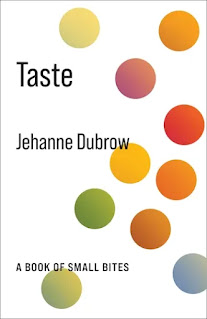 Wild Kingdom (2021), and a book of creative nonfiction, throughsmoke: an essay in notes (2019). Her poems and essays have appeared in Poetry, New England Review, Colorado Review, and the Southern Review.
Wild Kingdom (2021), and a book of creative nonfiction, throughsmoke: an essay in notes (2019). Her poems and essays have appeared in Poetry, New England Review, Colorado Review, and the Southern Review.
Dubrow applied the Page 99 Test to her new book, Taste: A Book of Small Bites, and reported the following:
Here’s what you’ll find on page 99 of Taste: A Book of Small Bites:Learn more about the book and author at Jehanne Dubrow's website.Today, I’m trying to find an old photograph of my mother. She’s smiling at the camera, a blanketed weight in her arms. She is just about to finish feeding me, about to button her shirt again, to dab a drop of milk from my lips. In my memory, the snapshot is cast in the golden light of late afternoon. It has the shine of archetype, like a classical image of the Madonna with her child. And because I can’t find the photo album to confirm what I remember—I’m sure Mommy glowed with joy, that she was radiant in the picture—I search the Internet instead for representations of mothers and babies. I want to see how the old painters depicted this most mundane of actions, Mary feeding her holy son, a sliver of breast visible to the viewer. I want to find paintings that show us these famous bodies—divine and biblical—as human, the Madonna tired as any new mother might be after nights of tiny…It's the opening paragraph from a brief essay called “The Tiny Thread of Milk,” which appears at the start of the umami section of the book (Taste is divided into five parts focusing on the five known tastes: sweet, sour, salty, bitter, and umami). “The Tiny Thread of Milk” focuses on breastmilk—a substance that is rich in umami—and looks at paintings by da Vinci and Mary Cassatt to explore visual representations of nursing mothers.
Page 99 of Taste is very typical of the book as a whole. It’s lyrical, a little intimate, but also prepares the reader for close reading and scholarly thinking.
I created Taste for Columbia University Press’s No Limits, which is a series dedicated to interdisciplinary philosophical writing. So, Taste isn’t a personal essay but something more hybridized. In the book, I write about foods as well as substances like sweat and tears. The book includes meditations on novels and poems, works of religion and philosophy, fairytales and mythology, operas, plays, movies, and the plastics arts. I am not a philosopher by training. Taste is idiosyncratic. It’s grounded in my sensibilities as a poet and the particularities of my personal history. My hope, when people read Taste, is that they will imagine what their own versions of such a book would include. When you think of the important tastes in your life, what are they? What do they say about you, who you are, your origins?
Writers Read: Jehanne Dubrow (April 2010).
Writers Read: Jehanne Dubrow (November 2012).
Coffee with a Canine: Jehanne Dubrow and Argos.
Coffee with a Canine: Jehanne Dubrow & Lola and Bandit.
Writers Read: Jehanne Dubrow.
--Marshal Zeringue



